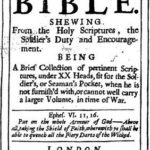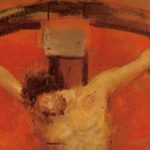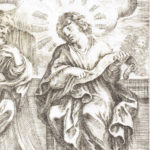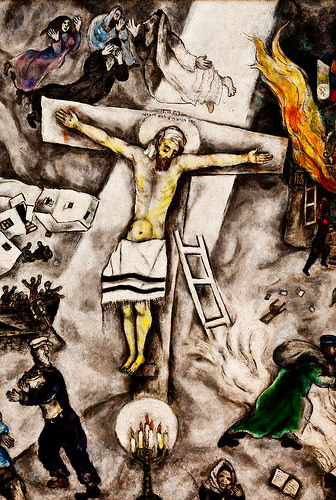We run our website the way we wished the whole internet worked: we provide high quality original content with no ads. We are funded solely by your direct support. Please consider supporting this project.
The Cross Above All Else
The way to know what a person or people group really believes is not to ask them but to watch them. Christians frequently say, “It’s all about Jesus,” but our actions betray us. Judging by the amount of time, energy, and emotion that many put into fighting a multitude of battles, ranging from the defense of the literalness and inerrancy of the Bible to war against gay marriage or universal health care, one easily gets the impression that Christianity is about a lot of different, equally important, things.
This unfortunately sends the message to the broader culture that becoming a follower of Jesus requires a person to embrace all of this. …
Strip away all the clutter, and what is left is simply the cross, where God reveals his true character and invites us to be transformed into his likeness through the power of his love. We trust that our fallen and self-oriented character will be transformed into God’s cruciform character. That is the kingdom, pure and simple.
The central significance of the cross is reflected in the fact that the sign of our covenant relationship with Christ is communion. When we look to the cross, we see the heavenly bridegroom wooing us, as his prospective spouse, by opening up his heart and revealing his true character. On the cross we see the heavenly bridegroom demonstrating his perfect love for his prospective bride—all of humanity—even while she had assumed the posture of an enemy toward him (Rom. 5:10). On the cross we see the heavenly bridegroom paying the required dowry to acquire his bride and to free us from our self-inflicted bondage to sin and to the powers of darkness. And on the cross we see the heavenly bridegroom imploring every human being to accept his marriage proposal and to become his bride who is making “herself ready” for his return, when the wedding supper of the lamb will be celebrated and she shall begin her eternal reign with him (Rev 19:7-9).
We say “yes” to this proposal when we exercise faith, which is why Paul says we are saved and reconciled to God through faith (e.g. Rom. 3:22018; Eph 2:8). Faith involves trusting God to be faithful in his relationship with us as well as pledging ourselves to be faithful in our relationship with God. And the cross defines what that covenantal faithfulness looks like for both God and us. By taking the bread and the cup in fellowship with others, therefore, we are reminded of the love and faithfulness God demonstrated and pledged toward us on the cross, and we are reminded of our call to imitate the love and faithfulness to God and our neighbor that was modeled for us on the cross.
One of the most remarkable expressions of the all-encompassing nature of the cross is reflected in an incidental, but extremely important, comment that Paul made in the First Letter to the Corinthians. He noted that when he brought “the testimony of God” to Corinth, he hadn’t come “with eloquence of human wisdom.” He instead “resolved to know nothing … except Jesus Christ and him crucified” (1 Cor. 2:1-2). …
Everything we are to trust God for is found in the cross. We are not involved in a contract that would require us, or even just allow us, to comb the Bible to latch onto this or that particular passage as a kind of insurance policy that God will come through for us. We are rather in a covenant in which it is not particular things we trust God for; our trust is rather in God himself. … We trust God to be who he reveals himself to be on the cross and trust that his moment-by-moment attitude toward us is what he reveals it to be on the cross.
This excerpt is from Benefit of the Doubt, pages 231-234.
Category: General
Tags: Benefit of the Doubt, Communion, Cruciform Theology, Faith, Jesus
Related Reading

Something Else is Going On
The violent portraits of God in the Old Testament are a stumbling block for many. In this short clip, Greg introduces the idea that “something else is going on” in these passages, and that we can begin to see this something else when we put our complete trust in the character of God as fully revealed in…

Look at Jesus
http://youtu.be/AO2VBoyruIM Here’s a lovely reflection by N.T. Wright for your Sunday. When in doubt, look at Jesus. You can’t go wrong.

Jesus and Nationalistic Violence
Throughout the Old Testament, we find Israel spoken of as God’s “chosen nation.” The Israelites were to be a nation of priests whom God wanted to use to unite the world under him (Ex 19:6). Since nationalism and violence inevitably go hand in hand, as Jacque Ellul and others have noted, the covenant God made…

Why Did Jesus Die on the Cross?
If asked why Jesus had to die on the cross, most Christians today would immediately answer, “To pay for my sins.” Jesus certainly paid the price for our sins, but it might surprise some reader to learn that this wasn’t the way Christians would answer this question for the first thousand years of Church history.…

The Bible is NOT the Foundation
Many people imagine that the foundation of their faith is the Bible. This is viewed as the ultimate center around which everything they believe revolves. However, the foundation of the Christian faith is actually centered on a person, not a book. Whereas Islam has always presented itself as a “religion of the book,” the kingdom…

